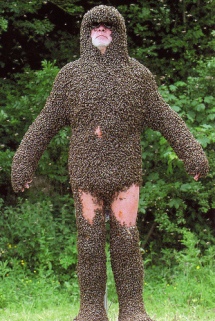
Maybe don't try this...
Only about 1,300 plants are grown for foods, spices, textiles, beverages and medicine. Of these, over 1,000 or almost 75% are pollinator dependent. Without pollinators, these items would be hard to come by. If you think you can do without them, guess again! Things like blueberries, chocolate, coffee, almonds, apples, bananas and potatoes all rely on the hard work of pollinators.
Over $40 billion of the US economy is created by pollinating insects such as bees. We are in for some serious food shortages and economic hardships if we don’t help the bees.
Aside from the economic impact, consider that almost 90% of all flowering plants rely on pollinators. Our world would not be as beautiful without the work of bees and other pollinators.
Pollinator conservation is at the core of sustainable agriculture. Each and every one of us is profoundly impacted by the work of pollinators. However, this is often overlooked. Reading this and taking the few small steps outlined below are a great start in helping the bees and all of our pollinating friends!
1) Create a pollinator friendly garden: This doesn’t need to be too fancy, just a few native plants that provide nectar for pollinators is a good start. If possible, create nest boxes for solitary bees. Supply water make sure you don’t treat your flowers with anything that will harm pollinators. For more information on creating a pollinator garden, click here.
2) Stop Pesticide Use: One of the main hardships pollinators are facing is the widespread use of pesticides that are toxic to them. Integrated Pest Management is a great way to curb pesticide usage. Whenever possible, plant flowers instead of grass.
3) Support Organic: Supporting your local, organic farms is a great way to help the bees. Organic farms are a great place for bees and pollinators to forage for nectar without being exposed to toxic pesticides.
4) Educate: Let everyone know how important bees and pollinators are. Teach your children to respect pollinators and explain to them the important role they play in our fragile ecosystem.
5) Hive Relocation: If there is a hive in your area that someone is going to destroy, contact a local beekeeper first to see if they will safely relocate the hive.
6) Get Active: Join one of the many great organizations working to help SAVE THE BEES™!
· Xerces Society
· NAPPC
· Mid-Atlantic Apiculture Research and Extension Consortium
· Heifer International





werd, thanks for the information. It is concerning how much will fail without bees and crew.
ReplyDeleteWow thanks for sharing this! I had no idea. You've opened my eyes.
ReplyDeleteHi! I don't know if you got my other email, but I didn't do it b/c my boyfriend was picking up a some silk from this place so I was going to give my part of it to u (i split it with a friend) so when it gets here I'll be able to get it to you sorry if it seems like I forgot :)
ReplyDeleteAnd, thanks for the bee info it is kind of sad but it is great that people are becoming more aware :)